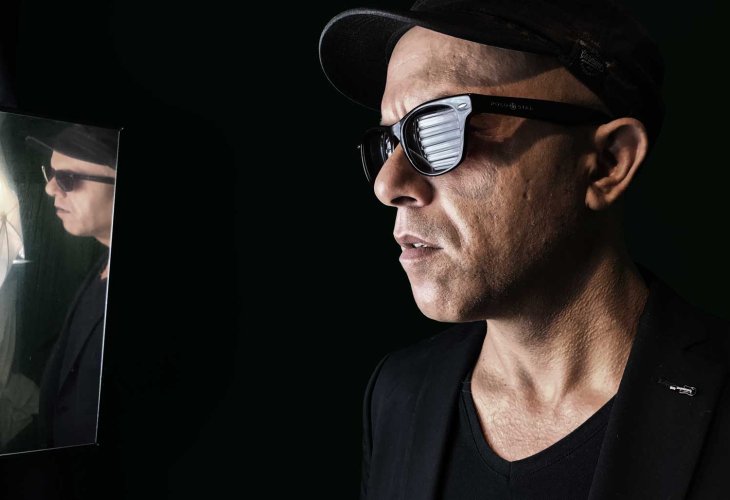What Helps Erez Lev Ari Escape Stuttering? A Revealing Interview on Creation, Judaism, and Emotion
After drawing closer to tradition, releasing four successful albums, and a fresh one in particular, Erez Lev Ari comes to his first interview with Hidabroot where he talks about childhood memories, a late-starting career, and one song that surprised him.
 Erez Lev Ari (Photo: Patrick Sabag)
Erez Lev Ari (Photo: Patrick Sabag)Nothing prepared the veteran artist Erez Lev Ari for the many and intense reactions sparked by his song "Nahum and Tzionah," which was released to the world about three years ago as part of his fourth album, "Cultural Stains." In this song, Lev Ari touched upon one of the most sensitive and painful nerves in Israeli society, yet, paradoxically, one of the least discussed.
"When I wrote the song, I didn't intend to be the voice of mentally injured soldiers," says Lev Ari. "The writing of the song stemmed from an old childhood memory I had. In the 1980s, I was a teenager, and in our neighborhood, there lived a bachelor in his thirties who still lived with his parents. At that time, in our neighborhood, this was very unusual.
"I don't think his name was Nahum, and I don't remember the exact name, but I remember that he always walked around with a small radio next to his ear. One day, I became really curious and asked my grandmother what his story was. She said it's from the army and didn't elaborate further.
"Since the song came out and to this day, I keep receiving responses from people with mental injuries or from those close to them. What I hear from them repeatedly is that this is the first time someone is talking about, or rather singing, their story. Many songs that deal with issues related to the army speak about death, bereavement, hope for peace, physical injuries, etc., but there are almost no songs about mental injuries.
"What’s also interesting in this context is that beyond the many responses I receive, over the years, I've developed connections with quite a few people suffering from PTSD. Many times after concerts, various people come to me and share very moving stories about this. In the army, I was a paratrooper, and it touches me deeply."
A Fight for the Home
Although the reactions to his song about soldiers with mental injuries were numerous and especially positive, positive reviews are not unfamiliar to Lev Ari's ears. In the decade that has passed since he burst into our lives with his acclaimed album "The Joy of Small Details" ("Tzedek," "Zakei et Ami"), Lev Ari has released three more albums that were loved by critics and listeners alike, and an additional fresh album recently making its debut.
Lev Ari (48), married and father of three living in Tel Aviv, has been composing and writing since a young age, and according to him, his connection to Hashem and the Jewish tradition, which strengthened over the years, also began at a young age. "I was born in the Krayot, to a traditional Mizrahi family. Things related to Judaism were definitely present in our home. For me, this issue of religion was always there. It was never foreign to me.
"My connection with the Creator," shares Lev Ari, "was always there. I would always talk to Him. From a young age. Beyond that, when I was a small child, I felt that there was always an eye watching over me, and because of that, I couldn't do foolish and bad things. It protected me greatly.
 Erez and the suits (Photo: Amit Ben Shoshan)
Erez and the suits (Photo: Amit Ben Shoshan)"Nevertheless, even though Hashem and tradition were always in the air, the practical closeness started for me specifically through Chabad. I have three friends who became religious through Chabad. They started talking to me about it and gave me the Rebbe's books. Later, there was also a period when my wife and I lived in a shared courtyard area in Neve Tzedek, where there were many Jewish studies, and thanks to that, it gained momentum.
"One of the highlights in this process happened a bit before I got married, at age 33, when I started keeping Shabbat. My wife started keeping Shabbat two years later, but I never told her to do it. She wanted to herself. However, in terms of studying Torah, she started before and still does more than I do."
Can you pinpoint something specific that led you to become more observant?
"Yes, it's very interesting. Of course, there are several things that led to it, but for me, the main strengthening came from a desire to protect the home. When I met my wife, I wanted there to be something that would protect us, and I thought it could help greatly in this regard.
"Everyone knows those who say: 'When I was single, I was free, and from the day I got married, I'm in prison.' I'm not saying this from a sticky romantic place, but as a bachelor, I was not free in any way. Marriage is the real freedom.
"In bachelorhood, I was in the chaos of desires and searching and mess and chasing after excitement. Only when I got married did I become truly free, and when I had children — even more so. You can only be truly free within something defined. Without a framework, there is also no freedom. When you have a family, home, security — that's when you can be free. And yes, it's also tied to keeping mitzvot and my creation.
"I really feel that Hashem influences my creation, and it generally occupies me. That's why He's also present in my songs. A prominent example of this is the song 'Ana Efna.' This song was added to my first album only five months after it came out. It was added only in the second edition, and suddenly the album began to sell very well.
"I wrote it for a television series. Its creators sent me episodes, and this is what came out. I personally go through the things described in the song, so the writing flowed relatively. Beyond that, in connection to the songs and Hashem, luckily, in my personality, I'm not someone who sings immodest songs, and this helps me a lot in this regard.
"By the way, someone once asked me in an interview where I got a certain song from. I told him I don't know, and if I knew, I would go there to get more. A song is not from you. It’s a miracle. Something that comes down from the heavens. It’s something from nothing. Hashem is truly the one who creates it.
"Everything comes from Him in the end. When Hashem looks at you and says: 'I'll give him a song now,' it's truly divine providence, and frankly, it's a treat from Hashem. That moment slips away. It's hard to return to it. But if you are attentive and alert enough, you can catch it."
The Ever-Present Dream
And so, as we all know, Lev Ari certainly knows how to catch it. However, many are unaware that he started his music career at a very young age, but began writing his beloved songs at a relatively later age. "I started playing the guitar when I was 10, and the dream of being a singer was always there. A year after the army, I moved to Tel Aviv, put the singing dream on hold, and mainly played with artists, including Eti Ankri, Lea Shabat, and Meir Banai.
"Around the age of 30, I started writing songs I was more comfortable with, and only at age 37 did I release my first album. Its writing revolved around coming closer to Hashem. Since then to this day, I keep Shabbat, kosher, family purity, put on tefillin, and more. I was never very far from tradition; on Yom Kippur, I always fasted, of course, but in my early thirties, I met my wife, and it was easier for us to observe mitzvot together.
"My writing is very experiential. I get a lot of inspiration from what's going on with me at any given time. So naturally, these things made their way into the first album, which is why there are quite a few pieces from Psalms and Song of Songs in it. By the second album, I already had two children, and indeed this album deals more with family life. Then came two albums that were completely different. The fourth drained me emotionally because it contained personal life stories. I was at a stage in life where I could touch these wounds.
"Now," says Lev Ari, "I needed to lighten the soul a bit, and the album I released recently, which includes a combination of my words and tunes by Aris San, is different from everything I've done until now. I'm not one of those singers who have a whole reservoir of songs on the side. Each song takes me a lot of time and mental effort. But in this album, the whole writing process was much easier. I was even surprised by how quickly it went."
Towards the end of the interview, just minutes before I spread my wings towards the next destination, the topic we extensively discussed at the beginning of our meeting in Lev Ari's intimate studio, located above his home in Tel Aviv, came up again.
A few seconds after I opened my mouth, Erez noticed that I stutter. Like him. This matter surprised both of us. Erez did not expect a stuttering interviewer to come to interview him, and I, who thought I knew all the famous artists suffering from stuttering, found out that life has surprises.
Naturally, I won't share most of our candid conversation on this topic, but what I can say is that this revelation greatly relieved us, opened our hearts, and broke the ice into pieces. Naturally, I, as a stuttering interviewer, have a natural fear of how my stuttering will affect the conversation, and yes, it turns out, this matter bothers Erez, despite being a seasoned interviewee.
Lev Ari openly shared that one of the things that help him the most to escape stuttering is acting. Entering another character. Using a foreign accent.
"I think," says Lev Ari, "that in some way I felt like an actor while creating the new album. That's why it was much easier for me to make it. In the other albums, I brought heavy things that I dug out from within myself. I brought my opinions, insights, emotions, and more. In this album, it's not entirely my opinion. It's me in a lighter form. Without the complexities. Without the wounds of life and the past. Therefore, it was such a different experience, and unfamiliar."

